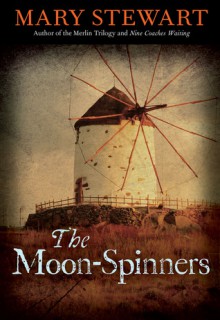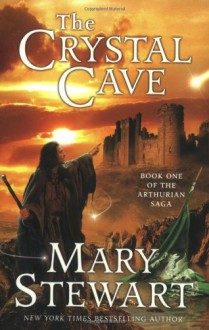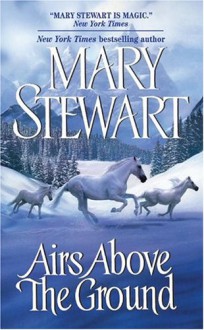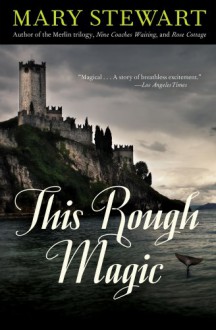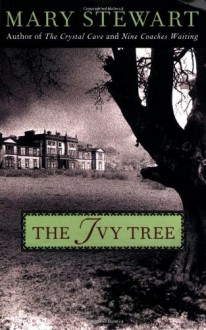
Madam, Will You Talk? was Mary Stewart's first novel, and as I had never read Ms. Stewart's books, I figured "first" was a good place to start. I zoomed headlong through my initial reading (almost as fast as Charity sped down those southern French highways and byways in her sporty Riley as she was pursued by Richard Byron), much too fast to adequately appreciate all the nuances in the exquisite writing, the beautifully crafted descriptions of Roman French countryside, and the surprising snatches of humor sprinkled throughout. Hands and arms all a-tingle, I recognized that thing I call "book magic" even as my attention was captured and held until the very last sentence. After a second reading I still found myself caught up in this story, resenting having to stop and highlight a passage or scribble a note. But at least that time I was a little more capable of admiring Ms. Stewart's craftsmanship, the way the plot twisted and turned throughout Madam, Will You Talk?.
"I'd rather just say that I write novels, fast-moving stories that entertain. To my mind there are really only two kinds of novels, badly written and well written. Beyond that, you cannot categorize. 'Storyteller' is an old and honourable title and I'd like to lay claim to it."
(Courtesy of http://mysteryscenemag.com)
Though any words of praise I may offer here feel completely inadequate and definitely do not do justice to this amazing author, I have to say Mary Stewart was an amazing writer and a master "storyteller" indeed. The opening line, for example, evokes almost the same wide-eyed wonder as that old fairy tale beginning "Once upon a time...", four words that, once upon a time, would leave me breathless in anticipation for whatever as yet unknown twist or turn or villain or quest was to come after.
"The whole affair began so very quietly." (p. 5)
I was hooked. Hooked by the fast-paced writing beautifully highlighted with breathtaking imagery as well as tantalizing expert bits of foreshadowing thrown in for good measure, evoking an exhilarating suspenseful atmosphere. The deftly drawn complex characters of Charity Selborne, Richard Byron, young David, Richard's son, Charity's best friend, Louise, John Marsden, Paul Véry, and Loraine Bristol made the journey from Avignon to Marseilles exciting, thrilling, and a feast for the mind. I loved when the tension was almost at a breaking point, Ms. Stewart would dial it back with a well-placed bit of humor and wit for comedic relief. Mary Stewart's Madam, Will You Talk? balances almost perfectly the elements of a pursuit by an unknown but relentless and menacing murderer and a dash of romance (even though it felt initially as a bit sudden).
I enjoyed very much the little snatches of humor sprinkled throughout. Louise, Charity's best friend, fades "like the Cheshire Cat" at the first sign of trouble anywhere. If there's a dispute between administrators at Alice Drupe Private School for Girls where she's employed as art instructor, don't ask Louise what happened. She was never there. If the hotel guests are up in arms after David disappears, Louise "just went away for the rest of the day. Naturally." Naturally.
When David tells Charity how he had frustrated Loraine's plans, he mixes his metaphors and Charity mixes them right along with him.
"'Gosh, she was furious, being hoist in her own juice like that. Is that right? It sounds a bit odd.'
'I rather think you mean stewing with her her own petard. But let it pass.'" (p. 177)
Or when Richard and Charity finally team up to go over every thing they know before confronting the real villain, even more metaphors are mixed:
"...we'll begin again at the beginning, rake over the ashes till we discover what makes them tick, probe every avenue to the bone -'
'I get you,' I said. 'Leave no hole and corner unturned. All right. I'm on.'" (p. 118)
Charity is probably one of the most capable and intelligent heroines I've read in a long time. She knows the difference between a distributor cap and a spark plug, she's cunning enough to elude and escape danger time after time, and she drives a car expertly, boldly and 100% fearlessly. She skillfully eludes a determined "mad man" in hot pursuit of her all the way from Les Baux to Marseilles. She can execute a controlled skid with the expertise of a Le Mans race car driver with astonishing aplomb despite being held at gunpoint by a villain. Take, for instance, this example in which Charity shows a tour bus who's the boss of the road:
"We were rapidly overtaking a bus which was indeed thundering along in the very centre of the narrow road. But I knew my stuff by now, after hundreds of heartbreaking miles before I had discovered that the 'courtesy of the road' means very different things in France and England. I swung to the left, bore down on the bus with every appearance of intending to ram it, and put the heel of my hand down hard on the horn. The bus, responding with an ear-splitting klaxon, immediately swerved to the left, too, straight into our path. I didn't even brake, but put my hand on the horn and kept it there. The bus, with an almost visible shrug, moved over about a foot to the right, and we tore by." (p. 31-32)
Charity is a force to be reckoned with and never is the weak damsel in distress, wringing her hands and waiting to be rescued. In fact, if there's any rescuing to be done, Charity is the person who can and will do it. I loved her from her entrance on to the stage of this little play in which "there had been love and lust and revenge and fear and murder - all the blood-thirsty bric-à-brac except the Ghost" to the happy ending with a promise of "Paradise" à la honeymooning in the Porquerolles.
Richard Byron, too, is a compelling character, pulling off a convincing menacing air from his and Charity's first meeting at the Temple of Diana until this "villain" transforms into the "hero" at just about the halfway point of the book. He is the epitome, in fact, of a Byronic hero as described by historian and critic Lord Macaulay: "a man proud, moody, cynical, with defiance on his brow, and misery in his heart, a scorner of his kind, relentless in pursuit of righting a wrong, capable of in revenge, yet capable of deep and strong affection." (courtesy of Wikipedia) There is a frisson of awareness, an instant attraction, at first, between the two which quickly turns threatening when Charity inadvertently drops young David's name into their conversation.
"I heard him take in his breath in a long hiss and looking up I saw his eyes narrowing on me in a look there was no mistaking. It was not imagination this time to see violent intentions there. If ever a man looked murder at anyone, Richard Byron looked it at me on that bright afternoon between the flaming beds of flowers in the gardens of Nimes.
(...)
"'Let go my wrist or I'll call the police!'
He laughed, an ugly little laugh. 'Call away.'
I bit my lip, and stood dumb. The police - the questions - my papers, my car - and I still had to get quietly out of Nimes with David. Richard Bryon laughed again as he looked down at me.
'Yes, you'd be likely to call the police, wouldn't you?' His grip tightened, and I must have made a sound, because his mouth twisted with satisfaction before he slackened his hold. 'Now, where's this boy you were with?'" (pp. 43-44)
Richard is an arrogant hero at the heart of this mystery, and Charity is a self-professed "managing woman" which I predict is a formula for fireworks between these two in their future dealings together. Richard, even Richard "in love", will never be a teddy bear. Louise very aptly and succinctly describes him, "dictatorial". I'll settle for highhanded.
Ms. Stewart paints with an elegant and lyrical brush astoundingly beautiful, detailed descriptions of the French countryside and sites from Avignon to Marseilles. Like this description of the River Rhone:
"Without sound or foam, smooth and incredibly rapid, it sucks it's enormous way south to the Mediterranean, here green as serpentine, there eddying to aquamarine, but everywhere hard in colour as a stone." (p. 23)
Or here, where she captures perfectly a moment of silence in the Temple of Diana at Nimes:
"It was like being miles from anywhere. Behind me, back through the crumbled archway, was the hot white world with people and it's voices; here, within, was a little square of quiet and green coolness. Trees dipped over the high broken walls, shadows lay like arras in the pillared corners, fronds of ferns lent softness to every niche and crevice. And silence. Such silence. Silence with a positive quality, that is more than just an absence of sound. Silence like music." (pp. 38-39)
And lastly, a favorite passage of mine as Charity and Richard walk along the sea wall at Marseilles:
"The houses were dark and secret, and the occasional lamps cast only a furtive light on the cobbles. Boats bobbed and curtseyed at the water's edge, rubbing each other's shoulders, the sea lipping at them with small sucking sounds. Where the shamefaced lamplight let fall a reflection on the water, the shifting surface cast a pattern of light upwards on to the bellies of the boats, so that they seemed to be swimming, netted in a wavering luminous mesh. Further on out in the bay, the green and red and golden riding-lights of the bigger ships drowned themselves in long liquid shadows. The ropes looked as fragile and as magical as gossamer." (pp. 97-98)
The descriptions of food are almost as detailed and poetic as Ms. Stewart's descriptions of the French landscapes. One or two in particular seem to me to be perhaps a bit more than just a food memoir. An English teacher once explained that sometimes food is just food in fiction, but if a writer spends a lot of effort and time describing a meal there's a good chance something deeper is going on. In the fairy tale "Hansel and Gretel" bread isn't just sustenance, it is a symbol of home and comfort and security. The food and placement of the food at the dinner party in James Joyce's "The Dead" is described in minute detail with a decided military flair, transforming a feast into a battlefield.
At Les Baux, Richard is still very much appearing villainesque, kidnapping Charity to intimidate/force David's location from her. Yet over the breakfast table at the inn, as Richard offers Charity a roll, she has a bewildering flash of awareness at how unsettling and surprising this nurturing gesture is at the hands of a violent murdering "mad man" bent on doing her harm swirling around with tender memories of her dead husband:
"There was something in the ordinary familiar little gesture over the breakfast table that made me suddenly still more sharply conscious of the queer and uncomfortable situation that I was in now, deeply in. I took the roll, still without looking at him, but memory stirred queerly...Johnny passing me the toast-rack, the marmalade...I bit my lip." (p. 68)
But Charity manages very neatly to escape and so begins the the final leg of their wild and crazy journey. Richard is a hero in pursuit, a chase that begins ironically at the Temple of Diana and culminates in the long, exhausting car chase from Les Baux to Marseilles before he finally runs her to ground. Despite Charity's almost fatalistic resignation to having been out maneuvered by Richard, his quiet reminder that they need to talk ignites a tamped down spark of anger. Charity, down but not defeated, makes it clear that she will never tell him anything about David. Here, at last, Richard sees clearly how he's misinterpreted Charity's actions, realizing her outright lies, half-truths, subterfuge, evasions, and wild-goose chases have all arisen from her desire to protect David. His realization sets up one of the most sumptuously detailed meal descriptions I've ever read.
It is a meal of seduction that begins with "a beautifully appointed restaurant", tables nestling in alcoves, soft lights, glimpses of "napery and glass and silver", comfortably luxurious seating in wine velvet. Richard's food choices for Charity are truly a feast for all the senses from the "glittering trolley of hors d'oeuvres" in "fluted silver dishes" exploding with dainty colors to anchovies, silver fish, caviar, pink mushrooms, red mullet, fowl with truffles, tiny peas, a "froth of ice and whipped cream dashed with kirsch", followed by apricots, and grapes. Throughout this elegant feast, accompanied by tinkling of silver cutlery, is a seemingly unending supply of wine followed by an after dinner "liqueur brandy ...swimming in its own fragrance, in the enormous iridescent glasses." Every aspect of this meal is elegant and exotic and exquisite. Coupled with Richard's altered demeanor, one that's more subdued, more introspective, more careful and caring of Charity's well being, this is more than food. It is a precursor to a communion of sorts. A mutual exchange, a sharing of intimate thoughts and emotions. It's there in the way he steadies Charity's hand to enable her to drink, to his gentle voice and even more, in his bowed head, giving him an almost palpably penitent air.
Here is the moment this novel shifts, when Charity sees Richard clearly, when the threads of romance between these two coalesce, when the courtship begins in earnest. If the preceding feast could be compared to a wedding celebration of sorts, this is the moment of consummation, a union of hearts and minds.
"...I leaned back against the cushions and looked about me with the eyes of a patient who had just woken from the first long natural sleep after an anaesthetic. When before the colors had been blurred and heightened, and the outlines undefined, proportions unstable, and sounds low and wavering, now the focus had shifted sharply, and drawn the bright little restaurant into sharp dramatic outline. I looked across at Richard Byron.
(...)
And the first thing that struck me was the deep unhappiness of that face; it was unhappiness rather than harshness that had driven those furrows down his cheeks, and given the eyes such sombre shadowing. As he sat with his head bent, obviously toying with his brandy-glass, the angry lines of brow and mouth were smoothed away, and instead there was a withdrawn and brooding look, an aspect harsh and forbidding enough, until it was betrayed by the unhappiness of the mouth.
His lashes lifted suddenly and he looked at me. I felt my heart jolt once, uncomfortably, then I met his gaze squarely." (pp. 94-95)
The book title, Madam, Will You Talk?, is a quote from an old courtship song called "Madam, Will You Walk?" The gentleman offers fine silver pins for his chosen lady's beautiful hair and the keys to his heart, but she refuses to "walk" and "talk" with him. He offers all the money he possesses, and she then, of course, is more than happy to walk and talk with him. But he, catching on to her mercenary heart, tells her: "When you could, you would not/Now you will, you shall not/So fare thee well." The song is inextricably tied to Richard's past, the murder mystery, and his relationship with Charity as his command "You will!" subtly flips to a gentle question of "Will you?" Take nothing for granted as you read Madam, Will You Talk? Take no one at face value. For all the players are multilayered, multi-faceted, and are much like the actors in a Greek play wearing masks to hide the person beneath. Physical descriptions are dealt with a light hand; instead understanding of characters comes by examining actions. A "smoothly handsome exterior" and "velvet-voiced Don Juan of the Mediterranean night" could be a mask hiding someone far more sinister.
Mary Stewart had her own bolt from the blue when she met Frederick Stewart at a party at Durham Castle. She described him as wearing "a girl's gym tunic, lilac socks, dance pumps - a red ribbon round his head". He asked her to dance, and she recalled thinking that he was "the one." They married three months later. (http://www.theguardian.com/books/2014/may/15/mary-stewart) From various articles I've read about Ms. Stewart, her husband encouraged and persuaded her to write, and Madam, Will You Talk? was the result. It was initially entitled Murder for Charity for which she was paid a paltry £50. She pursued a writing career for the love of storytelling, not for profit. According to her obituary the The Telegraph, she asked her publishers to "pulp" Madam, Will You Talk? upon seeing the proof. She said: "It felt like walking naked down the street, so much of oneself goes into a book." Thank heavens the publishers refused her request.


 Log in with Facebook
Log in with Facebook 

